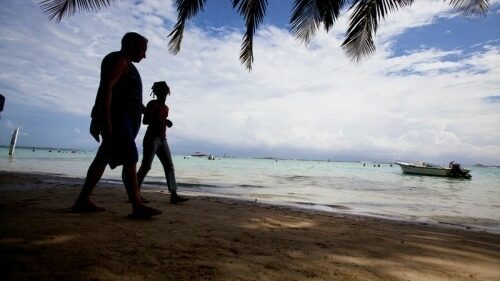New Study in the Dominican Republic: One in 10 Individuals in Commercial Sexual Exploitation are Children
Sex Trafficking
A cutting-edge study recently released by International Justice Mission reveals that one in 10 individuals engaged in commercial sexual exploitation in the Dominican Republic are children.
While many think of trafficking as abuse that takes place in brothels or bars, much of the trafficking in the Dominican is street-based, with pimps and traffickers selling children right out in the open. In fact, the study found nearly 1 in 4 commercial sex workers found on street corners, parks and beaches to be under 18 years old.
“Our research reveals that teens are being openly sold for sex on the streets in the Dominican Republic,” explains IJM Dominican Republic Director Fernando Rodriguez, Jr. “This is, in large part, because traffickers and customers operate with little fear of being caught. IJM is committed to working together with our law enforcement partners to protect children by putting these criminals behind bars.”
Studying a Hidden Crime
IJM opened in the Dominican Republic in late 2013 and in the summer of 2014 conducted a study to assess the prevalence of children being exploited in the commercial sex industry. The results of this study have informed our investigative strategies and casework since.
IJM investigators identified 20 towns known as hotspots in the commercial sex industry and mapped dozens of locations in these places. They chose towns based on information discovered online in chat rooms for sex tourists and through interviews with government officials, law enforcement, local business people and other NGOs on the ground.
The team surveyed 150 establishments (including brothels, bars and car washes) and 56 non-establishments (like streets, beaches and parks) to document the prevalence of child trafficking in this area:
- 10.0% — the overall prevalence of minors being exploited in the commercial sex industry
- 23.9% — the percentage of individuals working in the commercial sex industry outside of traditional establishments (such as on street corners, in parks and on beaches) who are under age 18
- 5.8% — the percentage of victims being sold for sex in brothels, bars and other businesses who are under age 18
The Dominican Republic is a source and destination country for trafficking. A recent UN report assigned the DR the third-fastest growth rate for human trafficking globally.
IJM’s research is the first of its kind to provide a statistically significant, real-time measurement of minors in the country’s commercial sex industry.
Significant Results to Impact Real Lives
The finding that most child trafficking is happening outside brick-and-mortar businesses is particularly eye-opening.
The head of the Public Ministry’s Anti-Trafficking Unit, Magistrate Jonathan Baro, is leading his unit to investigate criminals and shut down businesses that traffic children in the Dominican.
“Based on these findings, we now know that we must develop the appropriate strategies to identify and arrest criminals exploiting minors in the much more fluid settings of open areas like parks and beaches,” Baro said.
IJM worked with this unit last year on a complex operation to arrest two men who were exploiting a girl outside a traditional brothel. One of the men raped and sold 14-year-old Clarisa* to another man. Both are now standing trial, and Clarisa is living safely at an aftercare shelter.
IJM Vice President of Regional Operations for Latin America Pablo Villeda commended the Dominican government for its efforts and eagerness to enforce the country’s anti-trafficking laws. He shared his hope that the scourge of sex trafficking can—and will—end in the Dominican Republic:
“We know from our work in 17 other communities around the world that when governments partner meaningfully with civil society and make the necessary investments in law enforcement, courts, and services for victims, criminals are brought to justice and violent crime against the poor goes down.”